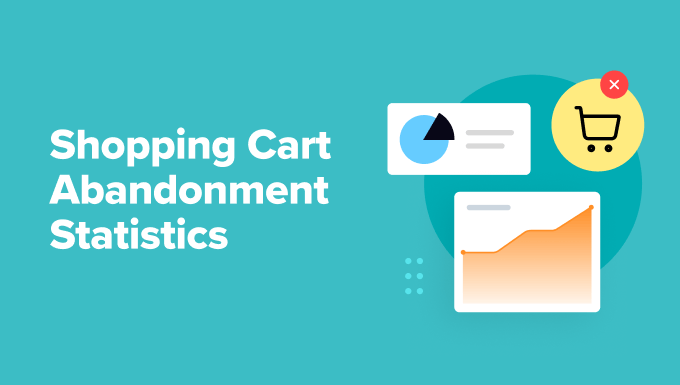When we first started helping businesses build marketplaces with WooCommerce, we were surprised by how many different multi-vendor plugins were available – and how vastly different they could be in terms of features and usability.
Through years of testing, we’ve learned exactly what makes a multi-vendor plugin truly effective.
The key isn’t just finding a plugin with lots of features, it’s finding one that aligns perfectly with your specific marketplace goals.
In this guide, we’ll share comparisons of the top WooCommerce multi-vendor plugins.
These insights come from real-world testing and feedback from successful marketplace owners who’ve used these solutions to build thriving platforms.
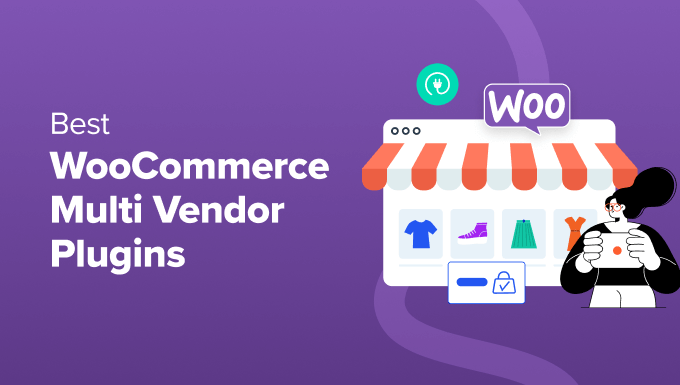
Overview: The Best WooCommerce Multi-Vendor Plugins
In a hurry? Here’s a quick overview of the best WooCommerce multi-vendor plugins.
| # | Plugins | Best For | Pricing |
|---|---|---|---|
| 🥇 | WC Vendors | Turning an online store into a marketplace + flexible vendor management. | $99.50/yr + Free |
| 🥈 | Dokan | Creating an Amazon-like marketplace with powerful vendor dashboard | $559 one-time + Free |
| 🥉 | MultiVendorX | Niche marketplaces with various monetization strategies like subscriptions + auctions | $399/yr + Free |
| 4 | WooCommerce Product Vendors | Official WooCommerce plugin for creating a diverse seller community | $119/yr |
| 5 | YITH WooCommerce Multi Vendor | Owner control over vendor capabilities and commission settings | $149.99/yr |
| 6 | WCFM Marketplace | Free setup with extensive vendor and owner features | Free + $19–$249 |
| 7 | Easy Digital Downloads | Digital product marketplaces + broad extension support | $99.50/yr |
| 8 | TeraWallet | Improves checkout by allowing customers to use a digital wallet with cashback options | Free |
| 9 | Product Feed PRO for WooCommerce | Boosting sales with marketing campaigns through product feeds for platforms like Google Shopping | Free |
Why Do You Need a WooCommerce Multi Vendor Plugin?
A WooCommerce multi-vendor plugin allows you to turn your store into a marketplace where vendors can easily sell their products. It adds a feature to your WooCommerce site where other users create their own stores and manage products, payments, and orders.
Rather than trying to tinker with code, WooCommerce multi-vendor plugins are the fastest way to get started.
Creating a marketplace might be useful if your website has a large audience who wants to buy certain products. Maybe you can drive traffic to the marketplace but don’t have the products to sell.
In that case, you can just bring sellers onboard to your marketplace and earn a commission for each sale.
Here are just a few advantages of building your own eCommerce multi-vendor website:
- Earn a commission: As mentioned, you can piggyback on the sales generated by vendors on your site. This is similar to dropshipping, where you can make money online without having to deal with the hassle of managing inventory or shipping.
- An expanded audience: The more sellers on your eCommerce platform, the more customers you’ll have. Each seller brings their own word-of-mouth contacts, established customer base, and social media presence, which means more visitors to your platform.
- Sell a wide range of products: Every seller can add their own unique products or services. This can be either physical or digital products. It’s a win-win for everyone because customers have more products to choose from.
- Save on costs: Creating a marketplace usually takes a huge upfront investment, such as hiring developers to code a website that offers multi-vendor functionality.
How We Test And Review WooCommerce Multi Vendor Plugins
To give you the most accurate and helpful insights, we tested each multi-vendor plugin in a real WooCommerce environment. Our goal was to help you choose a solution that not only works technically but also delivers real-world results for store owners and vendors alike.
In our review, we focused on features that are essential for running a smooth, scalable, and profitable online marketplace. Here’s what we evaluated:
- Vendor Management Tools: We checked how well the plugin handled multiple vendors and products. This includes support for unlimited product uploads, inventory control, vendor dashboards, and order/shipping management.
- Custom Storefronts and Branding: We evaluated whether each vendor can personalize their own storefront. This includes options for uploading custom logos, editing store headers, and having a unique shop URL.
- Commission Flexibility: We tested the plugin’s ability to support various commission models, like fixed rate, percentage-based, and tiered commissions.
- Payment Gateways: We looked at whether the plugin integrates with trusted payment systems like Stripe and PayPal.
- Integration with Other Tools: We tested integration with popular shipping plugins, marketing tools, inventory management systems, and accounting platforms to make sure everything works together without conflict.
- User Experience and Navigation: We explored the buyer’s journey, checking mobile responsiveness, product filtering, and on-site search functionality.
- Support and Documentation: We also evaluated the level of customer support provided. This includes checking for clear documentation, how-to guides, and whether there’s a responsive team available via ticket, email, or live chat when issues come up.
🙌 Why Trust WPBeginner?
At WPBeginner, we don’t just write about WordPress plugins, we actually use and test them on real websites.
When it comes to multi-vendor plugins, we’ve worked hands-on with many different solutions to see how they perform in actual WooCommerce environments.
From setting up vendor dashboards to processing test orders, we dive deep to understand how each tool handles real-world marketplace needs.
Our goal is to save you hours of trial and error by giving you clear, beginner-friendly advice based on real results. For details, see our editorial process.
With all that said, let’s look at the top WordPress multi-vendor plugins available so you can create a beautiful marketplace that attracts both buyers and sellers.
1. WC Vendors


WC Vendors is the best WooCommerce multi-vendor plugin, and has all the features you need to convert your online store into a marketplace and begin selling third-party products online.
During testing, we found it incredibly scalable and easy to use. For details, see our WC Vendors review.
You can easily accept registrations from potential vendors. That way, they can easily join and start selling on your platform.
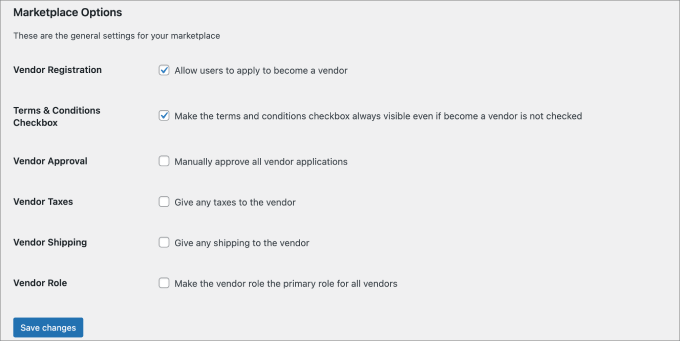
You can require admin approval, or vendor submissions can be approved automatically.
That said, if you require a more comprehensive application process, it’s best to use a dedicated form builder.
For example, WPForms would allow you to create a multi-page user registration form to collect all the information you need.
You may want to ask sellers about the types of products they sell, their current revenue, and whether they already have a retail store.
In addition, the plugin offers plenty of customization options. Individual vendors can create their own storefronts, and they have the ability to easily upload products, manage inventory, and fulfill orders.

Best of all, you can set the commission rate to a fixed or percentage rate. You can even set up a tiered system where you reduce commission rates for top sellers to incentivize them to keep selling on your website.
If you are not ready to commit to a paid plan, then WC Vendors offers a free version to help you get started. You can easily allow vendors to register, and you can set up a commission rate for sales.
Beyond that, all vendors have the ability to publish products.
That said, if you want more advanced features, such as creating a market for digital products or services, adding auction capabilities, and creating membership plans, then you’ll need to install the Pro version.
Pros of WC Vendors:
- WC Vendors has a setup wizard that makes it easy to set up
- Easily accept vendor registrations
- Accept customer reviews and ratings on each product page
- Each vendor gets their own store page with a unique URL, profile, and product listings
- Vendors can add, edit, and manage their own products, including downloadable and variable products
- The plugin lets you view and manage orders, mark orders as shipped, and input tracking information
- Comes with built-in SEO fields to improve product visibility in search engines
- Compatible with WooCommerce shipping plugins like UPS, FedEx, and Table Rate Shipping for accurate shipping costs
Cons of WC Vendors:
- While there is a free version, the best features are paid
Why We Recommend Using WCVendors: In our opinion, this is the best choice for turning your online store into a highly profitable marketplace. It has all the features you need to sell physical products, handcrafted and second-hand goods, digital products, services, and more.
Plus, since the plugin supports many WordPress themes and plugins, you can easily integrate all sorts of marketing apps to boost sales and conversations.
Pricing: Starts at $99.50 per year.
2. Dokan


Trusted by over 60,000+ marketplaces, Dokan is one of the most popular WooCommerce multi-vendor plugins on the market.
Like WC Vendors, it lets you create your own online marketplace, similar to Amazon, eBay, or Magneto, in under 30 minutes. We love that each vendor gets their own customizable dashboard on the storefront.
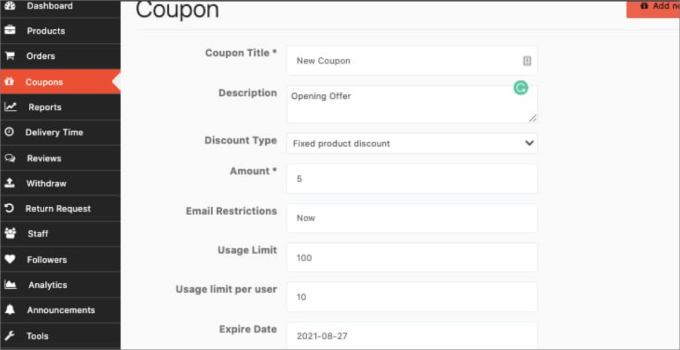
They can easily control and navigate each aspect of their store, like creating product listings, managing orders, creating coupons, and viewing sales reports.
However, the backend access is restricted to those with admin access only.
Dokan has arguably the most available payment gateways, with over 100+ integrations, including Apple Pay, Stripe Express, Google Pay, Razor Pay, and more.
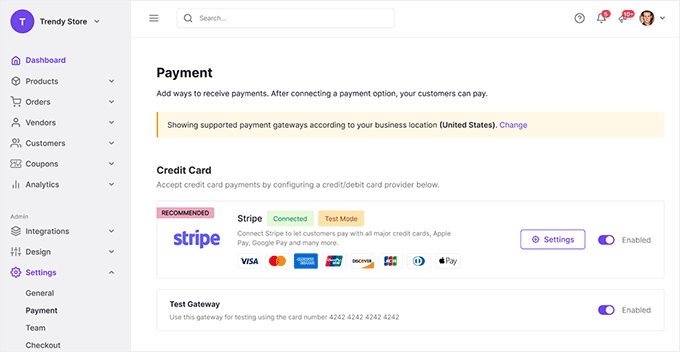
Vendors can enjoy automatic payment distribution, meaning that the plugin automatically calculates and distributes payouts with the commissions already included.
Also, vendors can easily manage shipments as well by selecting their own shipping zones or setting flat-rate shipping. It’s a good idea to have a built-in shipping calculator at the checkout page so customers can view the final price to avoid unexpected surprises.
Pros of Dokan:
- Dokan has 20+ extensions, allowing you to add a lot of different functionalities to your marketplace
- The plugin has a built-in order tracking system so vendors and customers can see the status of their shipments
- You can allow marketplace owners to set global, category-based, or individual vendor commission rates
- Easily create and manage all product types, including physical, digital, variable, and downloadable products
- Customize meta titles, descriptions, and social sharing images to boost their store’s visibility in search results
- Dokan allows vendors to request payouts, track earnings, and view commissions. Admins can approve or process withdrawals manually or via integrations like PayPal and Stripe
- It lets customers communicate directly with vendors through integrations like TalkJS or Facebook Messenger
- The solution has addons to turn your site into a booking, rental, or auction marketplace
Cons of Dokan:
- Dokan’s paid plan is more expensive than WC Vendors
- It doesn’t have advanced commission settings like WC Vendors
Why We Recommend Using Dokan: It’s hard to argue against Dokan, especially with all of its add-ons and integration capabilities. Dokan also provides all the essential features you need, like commission settings, vendor customization, and more.
Pricing: Free to get started with limited features. But if you want a full-featured marketplace with product bulk edits, multiple commission types, and reporting, the plans start at a one-time fee of $559.
3. MultiVendorX


MultiVendorX is one of the best plugins for creating a niche marketplace. What’s cool about it is that you are not limited to making just an eCommerce marketplace.
You can also add subscriptions, auction features, or even a rental marketplace. Let’s say you wanted only to sell handmade goods, similar to how you would use Etsy. With MultiVendorX, you are in total control.
We love that the tool gives you a wider range of monetization strategies than other platforms.
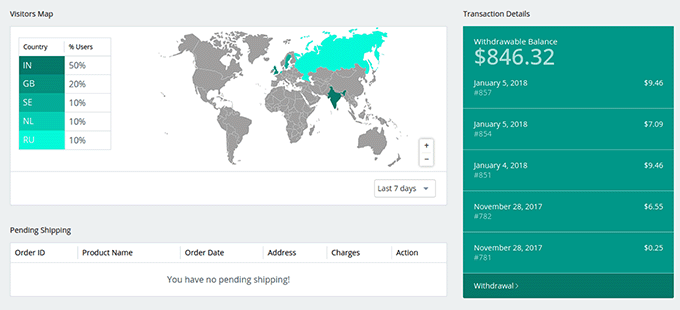
While you can charge a commission fee, you can also charge subscription fees, listing fees, pay-per-contact, pay-per-action, or a mixed model. Pay-per-contact and pay-per-action would be best suited to a service marketplace.
For example, when a user books a table at a restaurant through your marketplace, you would get paid for that.
MultiVendorX also offers an easy-to-read analytics dashboard so that you can view sales performance. You can filter by vendors, products, product categories, and more.
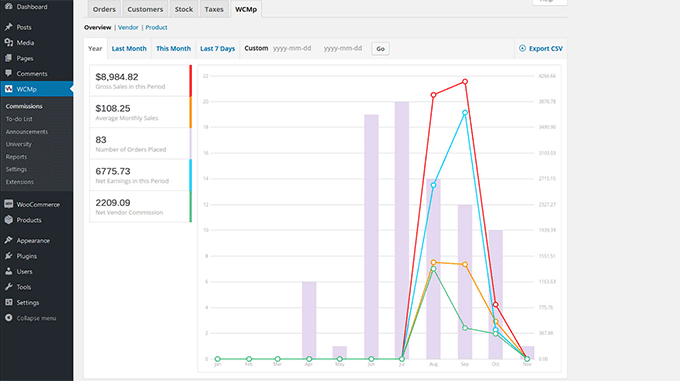
There’s even a Google Analytics integration that allows you to track your traffic sources.
That being said, we recommend using MonsterInsights to get insights from Google Analytics directly in your WordPress dashboard.
Pros of MultiVendorX:
- Vendors can easily create a product catalog
- You can create many types of niche marketplaces
- Admins can choose to auto-approve vendor product submissions or manually review them before publishing
- Track stock levels, manage orders, update statuses, and add tracking details independently
- Design custom registration forms to onboard vendors with specific information requirements
- Buyers can communicate with vendors using the built-in inquiry module or third-party chat integrations
- It is compatible with WPML, Polylang, and multi-currency plugins for global marketplaces
Cons of MultiVendorX:
- Paid plans are more expensive due to their diverse feature set
Why We Recommend Using MultiVendorX: If selling products isn’t your main focus, then MultiVendorX might be the perfect solution. It allows you to create niche, subscription-based, and auction marketplaces.
So, whether you want to be the next eBay or Craigslist, there’s something for everyone. The plugin offers many monetization options, so you are not just limited to charging commissions, either.
Pricing: Free to get started, but if you want advanced features, plans start at $399 per year.
4. WooCommerce Product Vendors
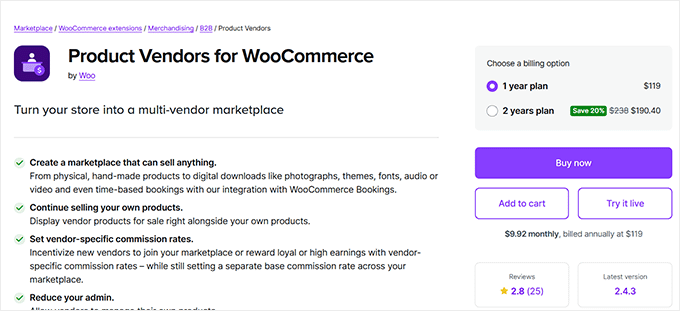

WooCommerce Product Vendors is an official plugin from WooCommerce that allows you to turn your store into a powerful marketplace. Using its core features, you can build a diverse community of sellers and set a commission rate for each one.
While using the plugin, we found it easy to add vendors to our WordPress site thanks to its intuitive interface and user-friendly design.
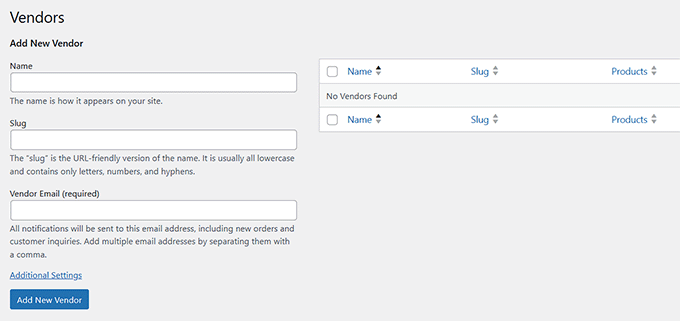
Although the plugin doesn’t offer the same level of customization as WC Vendors or Dokan, it still allows vendors to make some changes.
For example, they can manage their shipping rules, view sales performance, control their public profiles, and send customers tracking numbers.
The biggest advantage to using this plugin is that it’s a part of the vast WooCommerce ecosystem. It allows you to sell anything from digital downloads and handmade products to music, themes, photographs, and more.
You could even sell services and have customers book appointments using WooCommerce Bookings.
Pros of WooCommerce Product Vendors:
- The plugin lets you tailor the appearance of vendor pages to align with your brand
- Onboard new sellers easily with a customizable registration form
- Vendors can manage their product listings, orders, and inventories
- Each vendor gets a profile that includes business details, ratings, and a dedicated shop page
- You can set fixed or percentage-based commission rates per vendor or product
- Admins can review, approve, or reject vendor-submitted products before they go live
- You can allow vendors to register through a simple form and wait for manual approval by the site admin for quality control
- Vendors can define their own shipping rates (if enabled) and have tax options configured per product
Cons of WooCommerce Product Vendors:
- Vendors must have PayPal accounts to use the plugin’s automatic payout feature, which can be very limiting for sellers in certain regions
- It doesn’t allow vendors to customize the front end of their store
Why We Recommend Using Product Vendors: WooCommerce Product Vendors is a simple solution that lets you easily turn your store into a multi-vendor site. You can enable commissions based on a set amount, percentage, store, product, vendor, or individual.
Pricing: It costs $119 per year.
5. YITH WooCommerce Multi Vendor / Marketplace
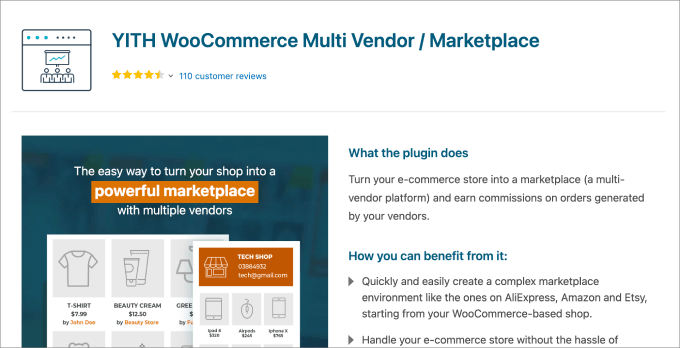

YITH WooCommerce Multi Vendor is a beginner-friendly WooCommerce multi-vendor plugin that allows you to create and manage an eCommerce marketplace similar to AliExpress, SHEIN, or Amazon.
It comes with both free and paid versions, so you can test the tool before committing.
What we found unique about the YITH WooCommerce Multi Vendor plugin is that you can customize what appears on the vendor side.
For example, you can perform actions like setting the seller’s header size and color, customizing the related products section, and more.
You can also set vendor permissions to control which product types they can access — such as simple, grouped, variable, or external/affiliate products.
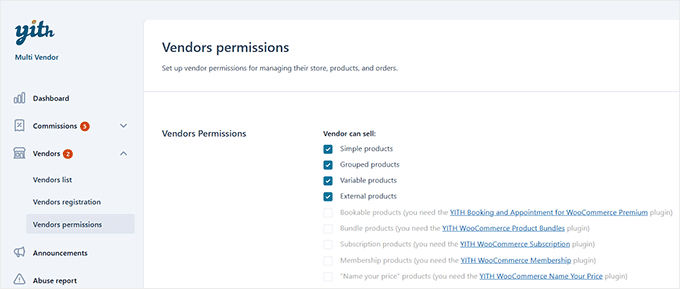
You also get instant compatibility with all of the YITH plugins.
For instance, if you wanted to add reviews of all products to each listing, then you could connect your site to the YITH WooCommerce Advanced Reviews plugin.
Pros of YITH WooCommerce Multi Vendor:
- You can easily set up your marketplace
- Customize the registration form and approve or reject vendor applications
- Set global, vendor-specific, or product-level commission rates
- Vendors have access to analytics and sales data to monitor performance and payouts.
- Customers can rate vendors and leave reviews for better transparency and trust
- Vendors can create and manage their own discount codes and coupon campaigns
Cons of YITH WooCommerce Multi Vendor:
- Vendors don’t have a lot of customization options to personalize their own store.
Why We Recommend Using YITH WooCommerce Multi Vendor: We like the YITH WooCommerce Multi Vendor plugin because it gives the owner a lot of control over what vendors can and can’t do.
You can set the commissions and permissions. For instance, you can decide whether you want to allow vendors to generate coupons, manage reviews, or limit the number of products they can publish.
Pricing: It costs $149.99 per year.
6. WCFM Marketplace
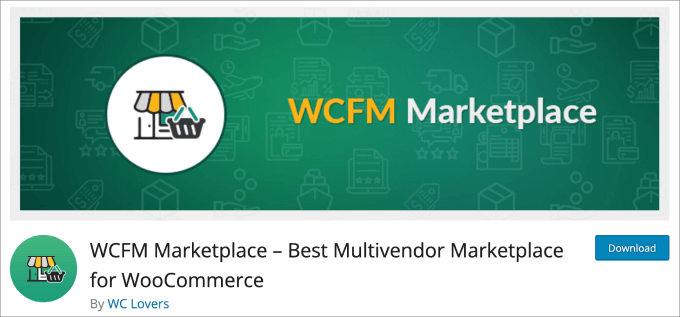

WCFM Marketplace is a free marketplace plugin from the WordPress repository. It has a lot of the essential features you’d expect, like flexible commissions, vendor registration, bulk product uploads, and more.
Plus, we love that vendors get a lot of control over their shipping rates. They can set them by zone, country, distance, weight, country, and even zip code.
The plugin also gives marketplace owners control over vendor transactions and policies. For example, you can set custom rules for withdrawals and disbursements, and even enable reverse withdrawals in cases where a customer requests a refund.
You’ll also have full control over refund policies. Whether you want refunds to be automatically approved or only allowed within a certain number of days, the plugin lets you configure everything to suit your business needs.
To keep track of all financial activity, you can visit the Ledger page, where you’ll find a complete record of orders, vendor payouts, refunds, and associated charges.
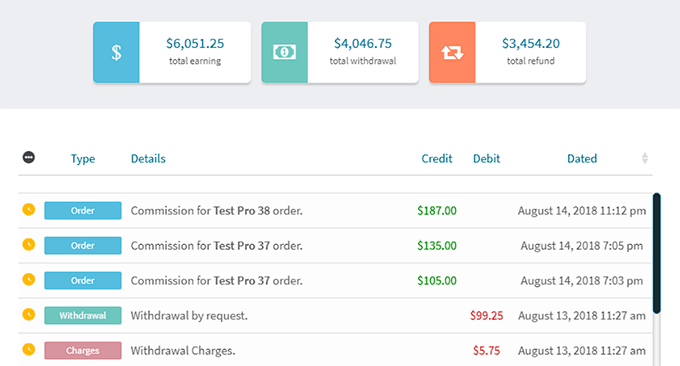
If you want additional features, then the WCFM Marketplace has a wide range of paid add-ons.
For example, the WooCommerce Frontend Manager addon allows you to set store hours, store vacations, add reviews, and more.
Pros of WCFM Marketplace:
- Marketplace owners have a lot of control over setting rules for operating their multi-vendor stores
- WCFM is a relatively affordable plugin with a free plan
- Vendors can configure the store’s SEO by placing appropriate keywords
- The plugin lets vendors request withdrawals based on order status or schedule, with options for manual or automatic processing
- Vendors can set shipping rates by zone, country, distance, or weight, and restrict shipping by country or zip code
- With WCFM, vendors can handle refund requests, with options for auto-approval or manual processing
Cons of WCFM Marketplace:
- There are complaints about the quality of customer service
- You need to pay for add-ons to allow vendors to customize and manage the front end of their stores
Why We Recommend Using WCFM Marketplace: WCFM Marketplace is a good option with a wide range of feature sets for both the marketplace owner and vendors. Plus, unique customizations such as seller verification and badges are available.
Pricing: Free to get started, but they offer a variety of premium extensions available that range between $19 to $249+.
7. Easy Digital Downloads
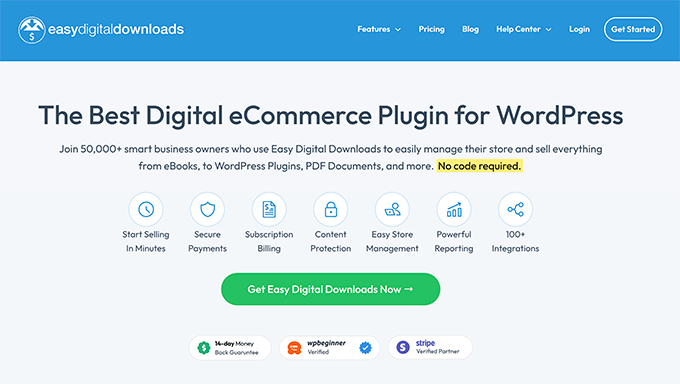

Easy Digital Downloads is a popular plugin for selling digital products like eBooks, courses, audio, PDFs, templates, and more.
While it’s not a WooCommerce plugin, it’s the best choice for people looking to turn their website into a digital product marketplace.
Several of our partner brands are using it to sell their plugins and have had an excellent experience. For details, see our EDD review.
With the Frontend Submissions addon, you can configure your own eCommerce store for selling third-party products.
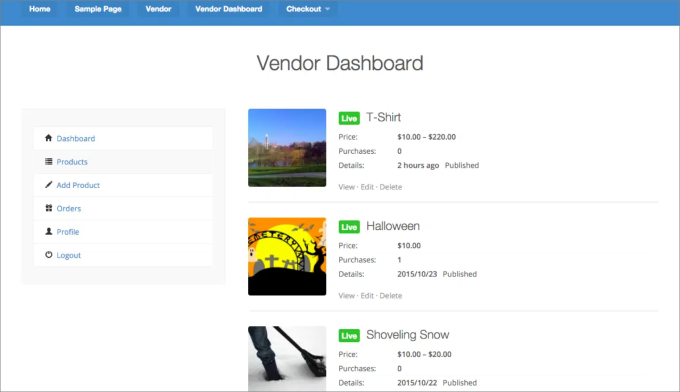
Once configured, you can allow anyone to sell digital products through your store, similar to Etsy or Gumroad.
On the front end, vendors can register to become sellers in your marketplace. Upon approval, they’ll be given access to a vendor dashboard, where they can create new products, add product pages, manage orders, access revenue stats, and communicate with customers.
What’s also nice about this addon is that it integrates with the Reviews extension. That way, customers can rate and leave reviews on the products they’ve purchased.
Vendors get valuable feedback about their products and can leverage these reviews as social proof for more orders.
For a full tutorial, check out our complete guide on how to create a digital product marketplace in WordPress.
Pros of Easy Digital Downloads:
- Easy registration process for vendors
- Drag-and-drop building makes it easy for vendors to create their own storefronts
- Vendors have the power to track their stats and communicate with customers
Cons of Easy Digital Downloads:
- Easy Digital Downloads is geared towards selling digital products, not physical products
- You will need the pro plan to access the Form Submissions addon
Why We Recommend Using Easy Digital Downloads: If you plan on selling digital products, then Easy Digital Downloads is the perfect choice. While it’s not a WooCommerce plugin, it still works for all WordPress websites.
Easy Digital Downloads also comes with a wide range of extensions like multi-currency capabilities, email marketing service, and payment gateway integrations, add-to-cart pop-ups, and more.
Pricing: Starts at $99.50 per year.
Other Useful Plugins for WooCommerce Websites
Besides having a WooCommerce multi-vendor plugin to simply create the marketplace, you might want to download a few additional tools to help provide sellers and buyers with a better user experience.
Here are a few tools to consider.
8. TeraWallet


TeraWallet is a free WordPress plugin that lets your customers easily store money in a digital wallet on your multi-vendor marketplace website.
Returning buyers can add money to their wallets using a variety of payment methods and later use it to make purchases. With this plugin installed on the website, customers won’t have to fill in their payment details every time or for every vendor they purchase from.
Beyond the core wallet functionality, TeraWallet has a useful cashback and rewards system that allows you to provide discounts to customers based on their purchases.
For instance, you can set cashback rates for specific categories or products and even provide bonus cashback during special events or seasonal promotions. This is a great way to build customer loyalty and drive more buyers to your marketplace.
Pros of TeraWallet:
- The plugin is free to use
- Customers can deposit funds, transfer money to other users, and make purchases with their wallet balance
- Customers can even make partial payments with the balance and the remainder with their credit cards
Cons of TeraWallet:
- It’s not a multi-vendor-specific plugin, so it works for regular WooCommerce and online stores, too
Why We Recommend Using TeraWallet: We like TeraWallet as a plugin to improve the user experience. If you want your customers to keep returning to your website, then it’s a good idea to ensure a seamless checkout experience. With TeraWallet, customers can keep an account balance, and sellers can reward them with cashback.
Pricing: Free to use
9. Product Feed PRO for WooCommerce
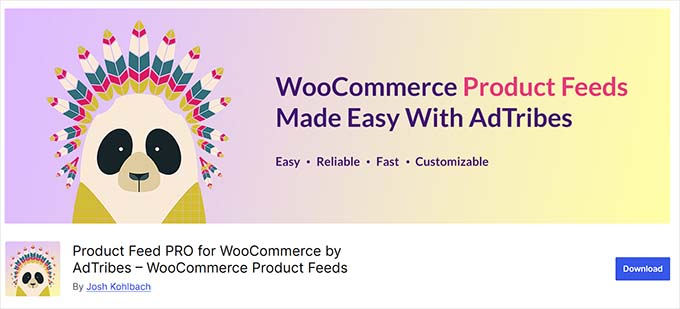

Product Feed PRO for WooCommerce is a plugin that helps you set up better eCommerce marketing campaigns.
During testing, we discovered that it helps you easily add product feeds to your marketing channels, such as Facebook, Google Shopping, Bing Ads, and others.
Adding these feeds will help you showcase your top sellers, which help you boost their sales. Best of all, this plugin has an unlimited number of products you can put in your product feeds.
In addition, you can set various filters and rules to show only your vendor’s most profitable products. You can exclude products that are low on stock, have low-profit margins, or only include products on sale.
Pros of Product Feed PRO for WooCommerce:
- Free and paid versions are available
- Filter rules allow you to show the best products for your marketing campaigns
- 100+ templates included for marketplaces and comparison shopping engines
Cons of Product Feed PRO for WooCommerce:
- It is not designed explicitly for multi-vendor sites, so each seller does not get their own control set
Why We Recommend Using Product Feed Pro for WooCommerce: We like Product Feed Pro for WooCommerce because it’s a good way to help advertise your marketplace. Adding product feeds to your Google Shopping campaigns will allow you to showcase some of the most popular products on your website and, in turn, help out your vendors.
Pricing: Free to use
What is the Best WooCommerce Multi-Vendor Plugin?
Choosing the right multi-vendor plugin really depends on the type of marketplace you want to build. If you want a complete all-in-one solution, then WC Vendors is your best bet.
It offers everything from vendor dashboards to shipping and commission management, making it super easy to run a professional marketplace.
However, if you are planning to build a big store like Amazon, then Dokan is a great choice. It comes with full vendor stores, frontend dashboards, and premium features for bookings, subscriptions, and more.
Meanwhile, MultiVendorX is ideal for creating niche marketplaces. Whether you’re selling handmade crafts, subscriptions, or running auctions, it gives you the tools to manage everything with ease.
On the other hand, if you already have a WooCommerce store, then WooCommerce Product Vendors is a simple way to let other sellers join in. You can assign vendor roles, track orders, and set commissions without rebuilding your site.
And if your store focuses on digital goods like software, music, or eBooks, Easy Digital Downloads with the Frontend Submissions addon is perfect for running a vendor-powered digital marketplace.
Frequently Asked Questions About WooCommerce Multi Vendor Plugins
What is the best multi-vendor plugin for WooCommerce?
Based on our experience and testing, WC Vendors is the best multi-vendor plugin for WooCommerce. Its combination of user-friendliness, customization, and diverse feature sets makes it the most popular choice for building your own online marketplace.
Why create a multi-vendor marketplace?
Creating your own marketplace allows you to stand out from the pack. You can create niche multi-vendor platforms to serve a specific audience, such as a marketplace for hand-crafted goods or an online booking system for online contractors. The possibilities are endless.
By creating a multi-vendor site, you can earn an additional income stream with commissions and serve a niche audience.
Guides to Help You Grow Your WooCommerce Store
Looking for more resources on growing your WooCommerce store? Check out these beginner-friendly guides:
If you liked this article, then please subscribe to our YouTube Channel for WordPress video tutorials. You can also find us on Twitter and Facebook.



